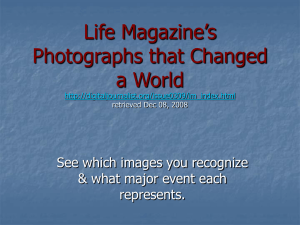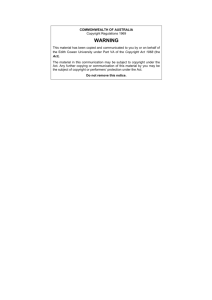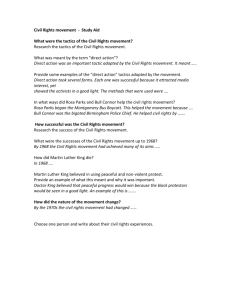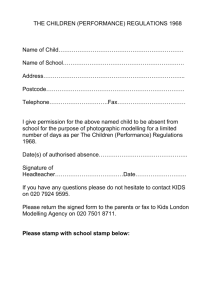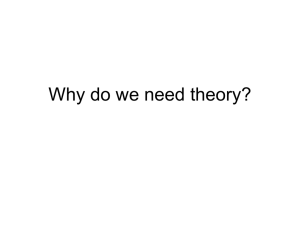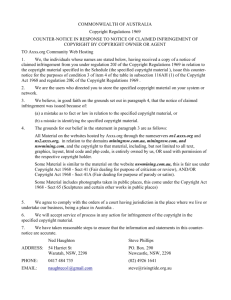1968 with Tom Brokaw
advertisement
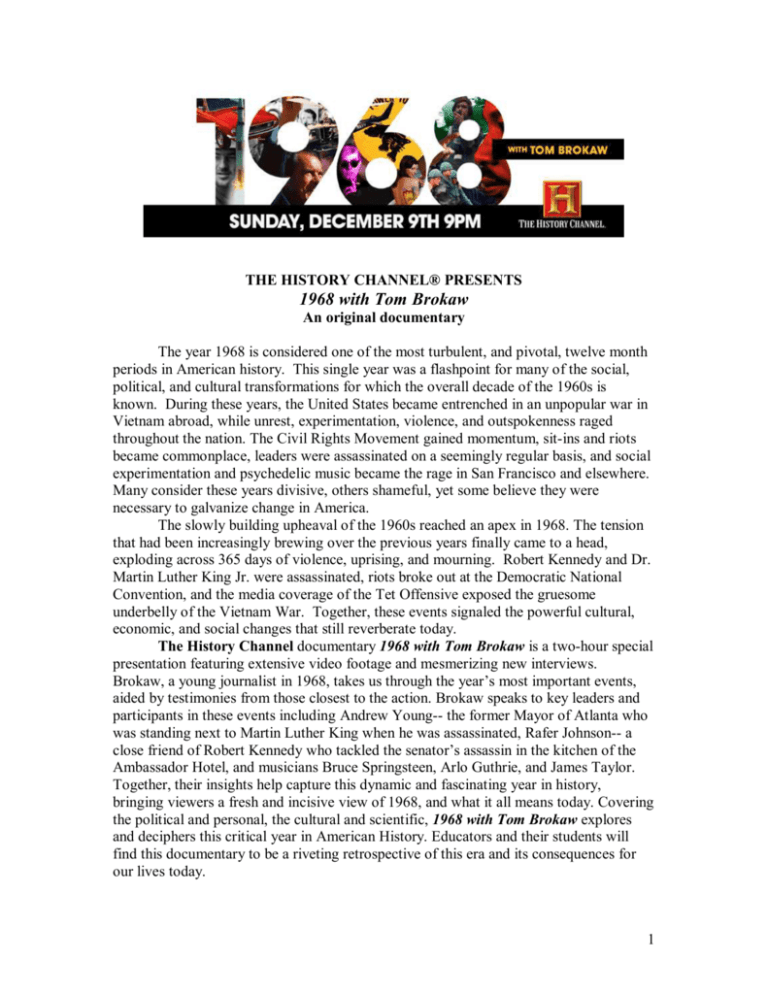
THE HISTORY CHANNEL® PRESENTS 1968 with Tom Brokaw An original documentary The year 1968 is considered one of the most turbulent, and pivotal, twelve month periods in American history. This single year was a flashpoint for many of the social, political, and cultural transformations for which the overall decade of the 1960s is known. During these years, the United States became entrenched in an unpopular war in Vietnam abroad, while unrest, experimentation, violence, and outspokenness raged throughout the nation. The Civil Rights Movement gained momentum, sit-ins and riots became commonplace, leaders were assassinated on a seemingly regular basis, and social experimentation and psychedelic music became the rage in San Francisco and elsewhere. Many consider these years divisive, others shameful, yet some believe they were necessary to galvanize change in America. The slowly building upheaval of the 1960s reached an apex in 1968. The tension that had been increasingly brewing over the previous years finally came to a head, exploding across 365 days of violence, uprising, and mourning. Robert Kennedy and Dr. Martin Luther King Jr. were assassinated, riots broke out at the Democratic National Convention, and the media coverage of the Tet Offensive exposed the gruesome underbelly of the Vietnam War. Together, these events signaled the powerful cultural, economic, and social changes that still reverberate today. The History Channel documentary 1968 with Tom Brokaw is a two-hour special presentation featuring extensive video footage and mesmerizing new interviews. Brokaw, a young journalist in 1968, takes us through the year’s most important events, aided by testimonies from those closest to the action. Brokaw speaks to key leaders and participants in these events including Andrew Young-- the former Mayor of Atlanta who was standing next to Martin Luther King when he was assassinated, Rafer Johnson-- a close friend of Robert Kennedy who tackled the senator’s assassin in the kitchen of the Ambassador Hotel, and musicians Bruce Springsteen, Arlo Guthrie, and James Taylor. Together, their insights help capture this dynamic and fascinating year in history, bringing viewers a fresh and incisive view of 1968, and what it all means today. Covering the political and personal, the cultural and scientific, 1968 with Tom Brokaw explores and deciphers this critical year in American History. Educators and their students will find this documentary to be a riveting retrospective of this era and its consequences for our lives today. 1 Curriculum Links 1968 with Tom Brokaw would be an excellent addition American History, 20th Century History, Journalism, Current Events, or Politics courses. Note: This documentary includes some sensitive content, and is therefore recommended only for mature high school students and college students. Teachers should view this program before screening it to students. This documentary fulfills the following standards as outlined by the National Council for History Education: (1) Civilization, cultural diffusion and innovation, (2) Human interaction with the environment, (3) Values, beliefs, political ideas and institutions, (4) Patterns of social and political interaction, and (5) Conflict and cooperation. Vocabulary Using the dictionary at www.merriamwebster.com, an internet resource such as www.history.com, or an encyclopedia, students should define and explain the significance of the following terms: Amnesty Audacious Concertina wire Momentum Phalanx Prevalent Self-indulgent Triage Upheaval Comprehension Questions 1. What were some of the major cultural and political events that directly preceded 1968? How did they influence the events which occurred in 1968? 2. What was the Tet Offensive? What did it reveal about the conflict in Vietnam and why was it particularly shocking for Americans? 3. How was Arlo Guthrie’s song “Alice’s Restaurant” a commentary on the draft? What message was Guthrie trying to convey, and why? Is there still a draft today? 4. What was at stake for those who dodged the draft? By going to Canada to escape the draft and military service, were people breaking the law? Do you think some draft dodgers were justified, or not? Discuss. 5. Why do you think the Haight-Ashbury district of San Francisco was the destination and home for so many in the counter-culture movement? How would you characterize this movement, and what is the actual definition of a “hippie”? 6. Why do you think the Smothers Brothers were so popular? By the same token, why do you think they were considered so controversial? Is there a need for personalities like John Stewart and the Smothers Brothers to “take off the veil” for society? 7. Why was George Wallace such a polarizing figure in politics? Why do you think he garnered such support, and how did his viewpoints compare with those of the other presidential candidates in 1968? 2 8. What was the Orangeburg Massacre? What were the repercussions of this violent event, and how do you think it influenced and affected the Civil Rights, and even the anti-war Movements? 9. What incited the various sit-ins and protests at Columbia University? How would you describe the make up of these protestors and what ultimately happened to them? Do you think that anything of this size and nature could happen today? Why or why not? 10. What were the various reactions to the assassination of Dr. Martin Luther King jr.? 11. Why do you think Robert Kennedy was such an influential and widely liked candidate, especially among minority groups such as migrant farm workers? What set him apart from Eugene McCarthy? Finally, why was the Senator assassinated? 12. What were the repercussions of the riots at the 1968 Democratic Convention? Can you think of any recent event that was covered and exposed so extensively on television? 13. What was the “silent majority” and why were they significant? How did this contingency ultimately affect the results of the 1968 Presidential Election? 14. Apart from the political, what were some of the other major events that took place in 1968? 15. Former Nixon speech writer Pat Buchanan considers 1968 one of the most divisive years in American History. Why? Do you agree? If so, would you characterize this divisiveness as detrimental, beneficial, or somewhere in between? Extended Activities The Year that Was As this documentary illustrates, 1968 was one of the most tumultuous, divisive, and hectic years in American history. Using images, first-hand accounts, and general information, create an illustrated timeline of the major events of 1968, making sure to cover political, social, scientific, athletic, and artistic events. These timelines can be in Powerpoint format, or on posterboard, roll-out or construction paper. You may want to divide into groups, with each group covering a different facet of this significant year. In the Crossfire Imagine you are a journalist, reporting in Vietnam during the Tet offensive. You have just traveled to the American Embassy in Saigon, which is under siege. What is it like to be on the front lines of the conflict? What are the wartime conditions? Make sure to use newspaper archives and military resources (easily found online) to find first-hand accounts. Then, either record or write an article, staying true to journalistic form. Report on what you are saw or experienced as if you were a reporter who witnessed the Tet Offensive. Outside Ideas Towards the end of this documentary, Bruce Springsteen comments that “The ‘60s made room for outsiders and their ideas.” Do you agree with this assessment? In what ways do you think that the 1960s, and in particular the major players and events of 1968, 3 corroborate or refute this claim to individuality and originality? Choose two or three relevant figures or events, research them, and write an essay arguing for or against Springsteen’s claim. Then and Now Some of the lasting images and video clips from 1968 were conveyed by the media. Whether an anchor reporting the death of Dr. Martin Luther King Jr. or footage of the riots at the 1968 Democratic Convention, our perception of history is often framed through newspapers, anchors and reporters. What are some of the more indelible images that you have seen from this divisive year in American history? For this assignment, choose one photograph or image from 1968. Make sure to consult primary sources, using online newspaper archives and other internet or library resources to find your image or photo. Then, write an essay or create a report about this image or photo, explaining what it portrays and its significance in the context of 1968. These writings can be creative or presented as traditional history papers. Share these projects with your larger class or group and discuss the overall legacy of 1968. 4 Special Project and Extended Activity “The Voices of 1968” Some of the most important speeches in American history were delivered in 1968; the chaos and urgency of the era seemed to demand strong words and powerful statements. Read the four quotes below and attempt to identify their authors. (Answer key provided at the very end of this study guide.) Then, pick one of these quotes or another famous speech from 1968. Pretend you were a reporter at the scene, and write a newspaper article capturing the speech, the environment, and the relevance of the words in the context of 1968. Who Said It? Match the following quotes with the correct author/sources listed below. 1.“Yet, I believe that we must always be mindful of this one thing, whatever the trials and the tests ahead. The ultimate strength of our country and our cause will lie not in powerful weapons or infinite resources or boundless wealth, but will lie in the unity of our people.” 2. “Men, for years now, have been talking about war and peace. But now, no longer can they just talk about it. It is no longer a choice between violence and nonviolence in this world; it’s nonviolence or nonexistence. That is where we are today.” 3. “What we need in the United States is not division; what we need in the United States is not hatred; what we need in the United States is not violence and lawlessness, but it is love and wisdom, and compassion toward one another, and a feeling of justice toward those who still suffer within our country, whether they be white or whether they be black.” 4. “My fellow Americans…we make history tonight not for ourselves but for the ages. The choice we make in 1968 will determine not only the future of America but the future of peace and freedom in the world for the last third of the 20th century, and the question that we answer tonight: can America meet this great challenge?” a. Robert F. Kennedy- April 4, 1968 after the assassination of Dr. Martin Luther King, Jr. b. Richard Nixon’s Acceptance of the Republican Party Nomination for President, August 8th, 1968 c. President Lyndon Johnson, March 31, 1968, announcing that he would not seek re-election d. Dr. Martin Luther King, Jr. April 3, 1968, “I’ve Been to the Mountaintop” speech (Answer key at the very end of this study guide.) 5 Additional Resources Websites The History Channel’s website devoted to 1968 with Tom Brokaw featuring video and audio clips, as well as many other interactive features: http://www.history.com/states.do?parentId=1968 Brown University’s website devoted to 1968, including a timeline, interviews, essays, and a useful bibliography devoted to this tumultuous year: http://www.stg.brown.edu/projects/1968/ The University of Virginia’s website devoted to “The Psychedelic ‘60s”, featuring images, essays, and extensive information on the 1960s. http://www.lib.virginia.edu/small/exhibits/sixties/index.html NASA’s Apollo 8 website, featuring an overview, statistics, images, and audio clips: http://nssdc.gsfc.nasa.gov/planetary/lunar/apollo8info.html The Nobel Foundation’s website devoted to Dr. Martin Luther King Jr. http://nobelprize.org/nobel_prizes/peace/laureates/1964/king-bio.html Books Brokaw, Tom. Boom! Voices of the Sixties, Personal Reflections on the Sixties and Today. Random House, 2007. Charters, Ann. The Portable Sixties Reader. Penguin Classics, 2002. Farber, David and Beth Bailey. The Columbia Guide to America in the 1960s (Columbia Guides to American History and Cultures). Columbia University Press, 2001. Kaiser, Charles. 1968 in America: Music, Politics, Chaos, Counterculture, and the Shaping of a Generation. Grove Press, 1997. Kurlansky, Mark. 1968: the Year that Rocked the World. Random House, 2005. Unger, Irwin and Debi Unger. Turning Point 1968. New York: Charles Scribner's Sons, 1988. Answer key for Voices of 1968 Extended Activity: 1) C 2) D 3) A 4) B 6
